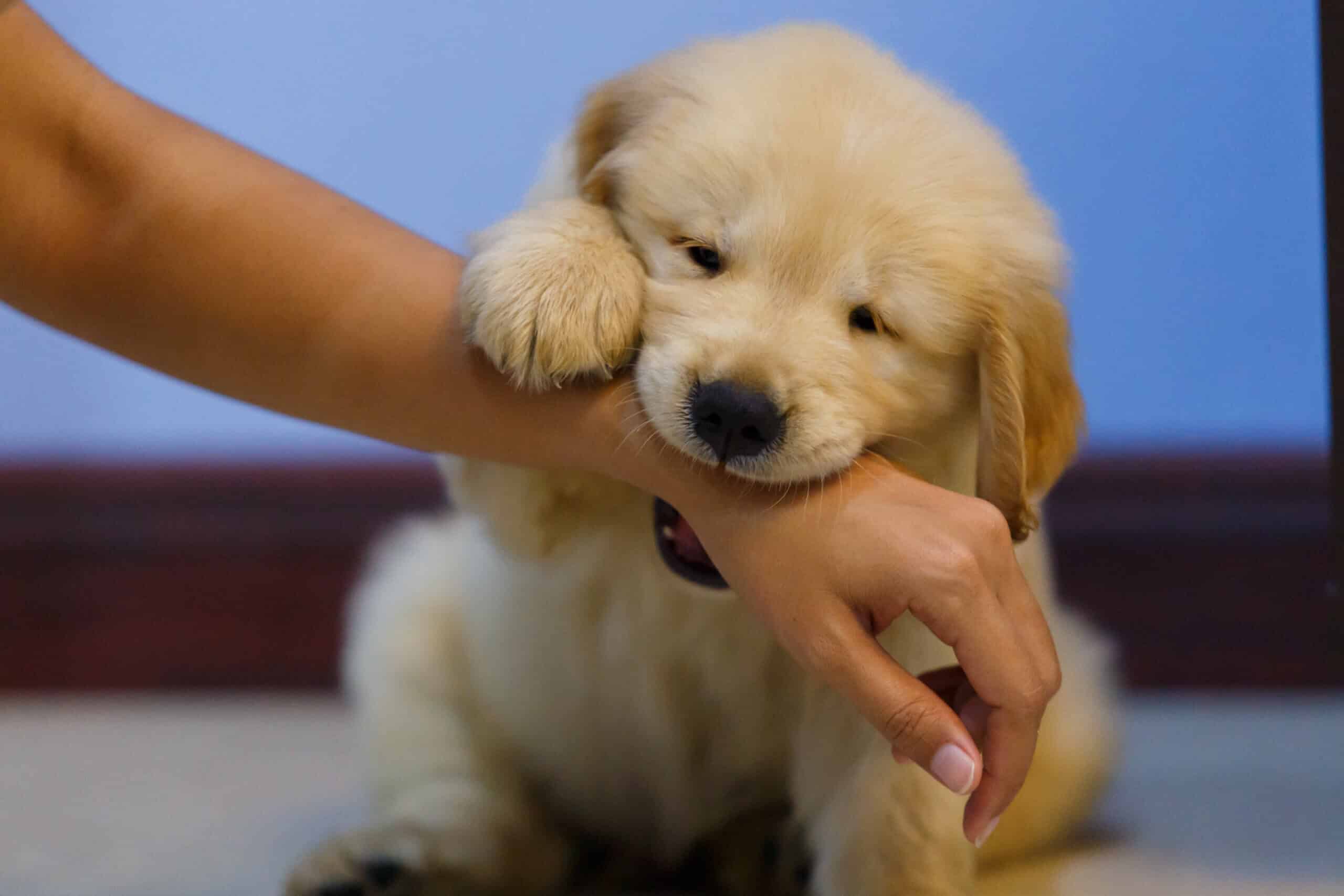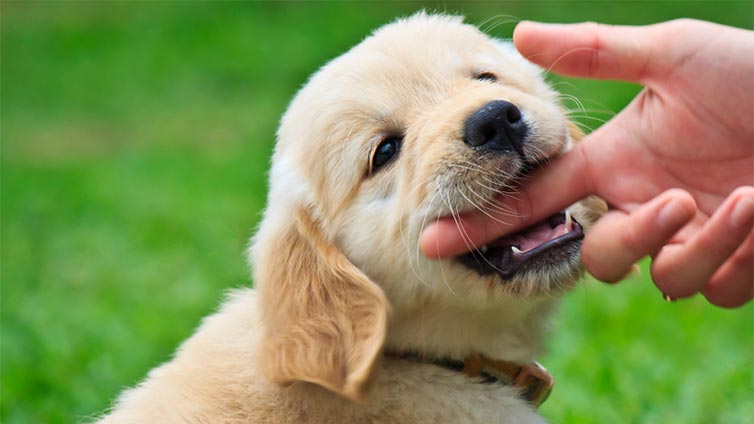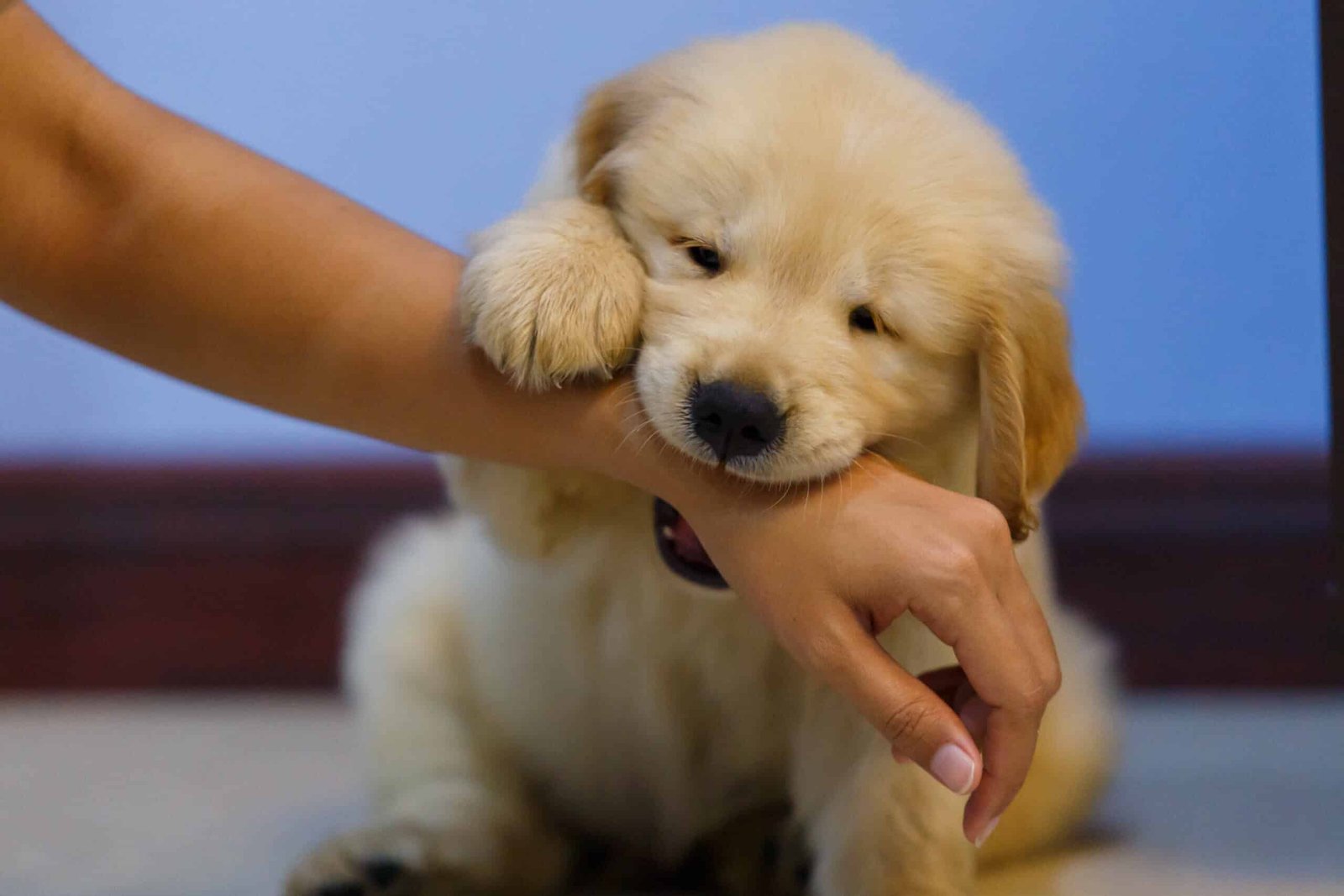When does a golden retriever puppy stop biting? Ah, the delightful and sometimes challenging stages of puppyhood! If you’ve ever had the pleasure of raising a golden retriever puppy, you may have experienced those tiny teeth sinking into your fingers during playtime. But fear not, my canine-loving friend, for there is hope on the horizon!
Puppies, including our lovable golden retrievers, go through a natural teething process as they grow. During this time, it’s common for them to explore the world with their mouths, which includes a fair amount of nibbling and nipping. But don’t worry, this phase doesn’t last forever!
As your golden retriever puppy develops, their biting behavior tends to decrease around the age of four to six months. During this period, their adult teeth start coming in, and their jaws become stronger. With proper training, socialization, and consistent reinforcement, you’ll soon find those sharp puppy teeth replaced with a gentle, wagging tongue. So hang in there, and let’s navigate this teething adventure together!

When Does a Golden Retriever Puppy Stop Biting?
A golden retriever puppy’s playful nature can bring joy and excitement to any household. However, a common concern for many owners is when their adorable bundle of fur starts biting everything in sight. In this article, we will explore the different stages of a Golden Retriever’s life and when you can expect their biting behavior to subside. Understanding this process will help you navigate the puppy phase and ensure a harmonious relationship with your furry friend.
Stage 1: The Teething Stage
During the teething stage, which typically occurs between three to six months of age, a Golden Retriever puppy’s baby teeth start to fall out and are replaced by their permanent adult teeth. Just like human babies, puppies experience discomfort and itchiness in their gums during this period. To alleviate the discomfort, puppies often develop a habit of chewing and biting on things. It’s important to provide appropriate chew toys and items to redirect their biting behavior.
Additionally, you can help soothe your puppy’s teething pain by offering frozen chew toys or wetting a clean cloth and freezing it for them to chew on. This will provide relief to their swollen gums and discourage them from biting on furniture, shoes, or other household items. Redirecting their biting behavior during this stage is crucial for teaching them appropriate chewing habits and setting a foundation for their adult behavior.
As the teething stage progresses, you may notice a gradual reduction in your puppy’s biting behavior. By the age of six to eight months, most Golden Retrievers will have finished teething, and their biting tendencies should significantly decrease.
Stage 2: Adolescence and Training
After the teething stage, Golden Retriever puppies enter adolescence, which typically begins around six to eight months of age and continues until they are around two years old. This stage is characterized by increased energy levels, independence, and a greater desire to explore their surroundings.
Biting behavior during adolescence is often driven by a combination of factors such as playfulness, curiosity, and a desire to assert themselves. It’s important to establish clear boundaries and continue reinforcing proper bite inhibition during this stage. Consistent and positive training methods, such as redirecting their attention to appropriate toys or rewarding them for good behavior, will help deter unwanted biting.
Adolescence can be a challenging time for both owners and puppies, but with patience, consistent training, and positive reinforcement, you can help your Golden Retriever navigate this stage and learn appropriate behavior. By the time they reach adulthood, around two years old, biting tendencies should have subsided significantly.
Stage 3: Adult Behavior
As Golden Retrievers transition into adulthood, their biting behavior should diminish as they become more settled and well-rounded dogs. By the time they reach two years old, biting should be a rare occurrence, if it happens at all. However, it’s essential to note that all dogs are individuals, and some may take longer to outgrow biting tendencies than others.
Adult Golden Retrievers may still exhibit mouthing behavior, which involves gently holding objects or limbs with their mouths. This behavior is considered normal as long as it is not rough or aggressive. Should you notice any aggressive biting behaviors in an adult Golden Retriever, it is essential to seek professional guidance from a certified dog trainer or behaviorist.
Remember, patience, consistency, and positive reinforcement are key throughout all stages of your Golden Retriever’s life. By understanding the different stages and expectations of their behavior, you can help them grow into well-behaved adult dogs and build a strong bond with your furry companion.
Tips for Managing Biting Behavior in Golden Retriever Puppies
Now that we’ve explored the different stages of a Golden Retriever puppy’s life and when to expect their biting behavior to diminish, let’s discuss some strategies for managing this behavior during these stages:
1. Provide Appropriate Chew Toys
During the teething stage, it’s crucial to provide your puppy with appropriate chew toys to redirect their biting behavior. Look for toys specifically designed for teething puppies, such as rubber toys or Kong toys filled with frozen peanut butter or treats. These toys not only soothe their gums but also provide mental stimulation for your puppy.
Additionally, rotate the toys to keep them interesting and prevent boredom. This will help prevent your puppy from seeking out furniture or other household items to chew on.
2. Use Positive Reinforcement
Positive reinforcement is a powerful tool in shaping your Golden Retriever puppy’s behavior. Whenever your puppy exhibits appropriate chewing behavior, such as chewing on a toy instead of your hand, offer praise and rewards. This positive association will reinforce the desired behavior and encourage your puppy to continue chewing on appropriate items.
Avoid using harsh punishment or yelling when your puppy bites. Instead, redirect their attention to a chew toy and reward them for biting the toy instead of your hands or feet.
3. Socialize Your Puppy
Exposing your puppy to various experiences, environments, and other dogs at a young age can help reduce biting behavior. Socialization plays a vital role in shaping your puppy’s behavior and teaching them appropriate interaction with others.
Enroll your puppy in puppy training classes, where they can learn how to interact with other dogs under the guidance of a professional trainer. These classes also provide an opportunity for your puppy to learn bite inhibition through play and interaction with other puppies.
4. Establish Clear Boundaries
Consistency and clear communication are essential for managing biting behavior in Golden Retriever puppies. Establish rules and boundaries from the beginning and enforce them consistently. Consistency helps your puppy understand what is expected of them and reduces confusion.
If your puppy starts biting during play, immediately stop engaging with them and withdraw your attention. This teaches them that biting results in the end of playtime. Gradually reintroduce play once they have calmed down or redirected their biting behavior to a toy.
Remember, managing biting behavior requires patience and dedication. With consistent training, positive reinforcement, and appropriate redirection, your Golden Retriever puppy will eventually learn to control their biting tendencies and grow into a well-behaved adult dog.
Conclusion:
Understanding when a Golden Retriever puppy stops biting is crucial for owners to navigate the challenging puppy phase and establish a harmonious relationship with their furry friend. By recognizing the different stages of their life and addressing biting behavior through appropriate training, toys, and positive reinforcement, you can guide your puppy towards becoming a well-behaved adult dog. Remember, each dog is unique, and patience and consistency are key to success. Enjoy the journey of raising your Golden Retriever puppy and creating a strong bond that will last a lifetime.
Key Takeaways: When Does a Golden Retriever Puppy Stop Biting?
- Golden retriever puppies usually stop biting around 4 to 6 months of age.
- Biting is a natural behavior for puppies as they explore the world with their mouths.
- Consistent training and socialization can help reduce and redirect biting behavior.
- Providing appropriate chew toys and engaging in interactive play can help satisfy a puppy’s need to bite.
- Seek professional help if biting behavior becomes aggressive or excessive.
Frequently Asked Questions
Are you tired of your golden retriever puppy constantly biting? Don’t worry, we have answers to your burning questions! Read on to find out when your adorable furball will stop their biting behavior.
1. What Is the Typical Age When a Golden Retriever Puppy Stops Biting?
Golden retriever puppies usually start losing their baby teeth and replacing them with permanent teeth around the age of three to four months. During this teething phase, they may exhibit increased biting behavior. The biting tendency usually subsides as they reach five to six months old.
However, it’s important to remember that every puppy is different, and some may take longer to grow out of their biting habits. Consistent training and redirection of their biting behavior will help speed up the process.
2. How Can I Teach My Golden Retriever Puppy to Stop Biting?
Teaching your golden retriever puppy to stop biting requires consistent training and positive reinforcement. Here are a few tips to help you:
First, provide appropriate toys and chew items for your puppy to redirect their biting onto. When your puppy starts biting you, firmly say “no” and immediately give them an appropriate chew toy. Praise and reward them with treats when they choose the toy instead of biting you. Additionally, engage in regular play and exercise sessions to help burn off excess energy and reduce the urge to bite.
3. What Should I Do If My Golden Retriever Puppy’s Biting Becomes Aggressive?
If your golden retriever puppy’s biting becomes aggressive and causes harm or distress, seek guidance from a professional dog trainer or behaviorist. They can assess the situation and provide specialized training techniques to address the aggression. In the meantime, ensure your puppy is in a secure and safe environment and avoid situations that may trigger their aggressive biting behavior.
Remember, with professional help and consistent training, you can address and manage your puppy’s aggressive biting behavior effectively.
4. Are There Any Training Tools I Can Use to Stop Biting?
When it comes to training tools, it’s important to focus on positive reinforcement rather than relying on tools that may cause harm or promote fear. Avoid using tools like shock collars or prong collars, as these can potentially harm your puppy and create negative associations with training.
Instead, utilize tools like treats, chew toys, and clickers to reinforce positive behavior and redirect biting onto appropriate items. Remember, patience and consistency are key to successfully training your golden retriever puppy to stop biting.
5. Can I Socialize My Golden Retriever Puppy to Help Reduce Biting?
Absolutely! Socialization plays a crucial role in reducing biting behavior in golden retriever puppies. Introduce your puppy to various people, animals, and environments to help them become comfortable and confident.
Enroll your puppy in puppy socialization classes, where they can interact with other dogs and learn proper behavior and bite inhibition. Regularly expose them to new experiences, such as different sounds, surfaces, and situations, to help them become well-rounded and less prone to biting.

Summary
So, when does a golden retriever puppy stop biting? Well, it’s important to understand that biting is a natural behavior for puppies as they explore the world with their mouths. However, with proper training, socialization, and consistent reinforcement of positive behavior, you can teach your puppy to stop biting.
Remember, patience and consistency are key. Provide appropriate chew toys, redirect their biting to those toys, and reward them when they play gently. Gradually, as your puppy grows and matures, their biting will decrease, and they will learn to use their mouths more gently. Just keep up with the training, and soon enough, your golden retriever puppy will grow into a well-behaved and gentle companion.
